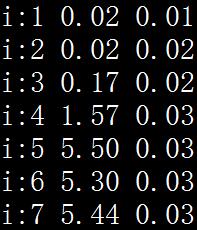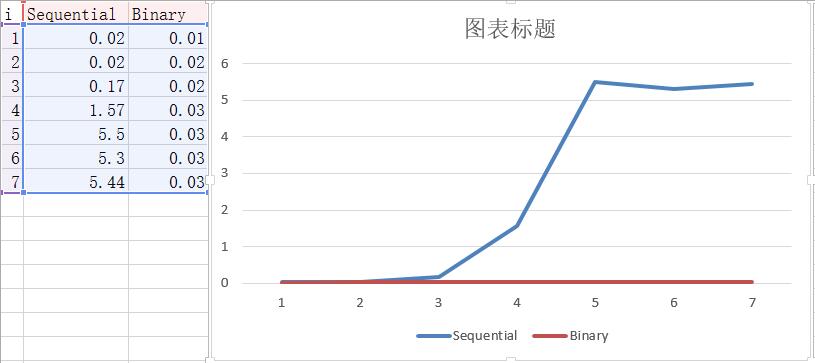Exercises
3.4
a
by the definition
3∗2n′=64∗3∗2n
2n′=2n+6
n’=n+6
c
by the definition
8n′=64∗8n
n′=64n
3.8
c
For the all values of n > 1,
c4nlogn+c5n≤c4nlogn+c5nlogn≤(c4+c5)nlogn
. Therefore, by the definition, T(n) is in O(n) for
n0=1
and
c=c4+c5
For all n > 1,
c4nlogn+c5n≥c4n+c5n≥(c4+c5)n
. Therefore, by the definition, T(n) is in
Ω(n)
for
n0=1
and
c=c4+c5
.
d
For the all values of n > 29,
c62n+c7n6≤(c6+c7)2n
. Therefore, by the definition, T(n) is in O(n) for
n0=29
and
c=c4+c5
.
For the all values of n > 29,
c62n+c7n6≥(c6+c7)n6
. Therefore, by the definition, T(n) is in
Ω(n)
for
n0=29
and
c=c4+c5
.
3.11
b
limn→∞n√logn2=limn→∞n√4=∞ , so f(n) is in Ω(g(n))
e
limn→∞nlogn+nlogn=limn→∞n=∞ , so f(n) is in Ω(g(n))
h
limn→∞2n10n2=∞ , so f(n) is in Ω(g(n))
3.12
a
Θ(1)
b
Θ(n)
c
Θ(n2)
d
Θ(n2)
e
Θ(nlogn)
f
Θ(nlogn)
g
Θ(n2logn)
Projects
3.2
#include<cstdio>
#include<cstdlib>
#include<ctime>
const int maxn = 1e7 + 100;
int a[maxn];
int random(int n){
return rand() % n;
}
int SeSearch(int val, int n){
for(int i = 0; i < n; i++)
if(a[i] == val) return i;
return -1;
}
int BiSearch(int val, int n){
int l = 0, r = n;
while(r - l > 1){
int m = (l + r) / 2;
if(a[m] > val) r = m;
else l = m;
}
return a[l] == val ? l : -1;
}
int main(){
for(int i = 0; i < maxn; i++) a[i] = i;
const int T = 100000;
int tmp;
clock_t begin, end;
for(int n = 10, k = 1; k <= 7; n *= 10, k++){
printf("i:%d ", k);
begin = clock();
for(int i = 0; i < T; i++)
tmp = SeSearch(random(n), n);
end = clock();
printf("%.2lf ", (double)(end - begin) / CLOCKS_PER_SEC);
begin = clock();
for(int i = 0; i < T; i++)
tmp = BiSearch(random(n), n);
end = clock();
printf("%.2lf\n", (double)(end - begin) / CLOCKS_PER_SEC);
}
return 0;
}| i | Sequential | Binary |
|---|---|---|
| 1 | 0.02 | 0.01 |
| 2 | 0.02 | 0.02 |
| 3 | 0.17 | 0.02 |
| 4 | 1.57 | 0.03 |
| 5 | 5.50 | 0.03 |
| 6 | 5.30 | 0.03 |
| 7 | 5.44 | 0.03 |
So binary search always faster than sequential search.
























 962
962

 被折叠的 条评论
为什么被折叠?
被折叠的 条评论
为什么被折叠?








